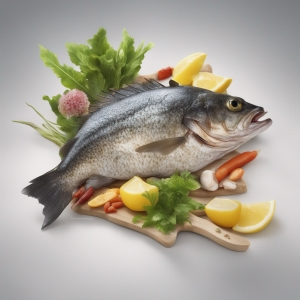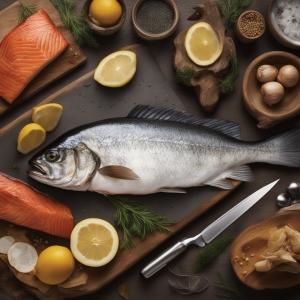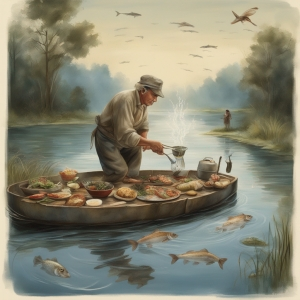Table of Contents:
Introduction: The Joy of Freshwater Fishing
If you are an angler or a camping enthusiast, you already regard the act of catching fish as a great pastime. But have you ever considered taking your love for fishing a step further? Entailing much more than merely dropping a line into the water, freshwater fishing can open up a world of culinary delights. In this article, we will guide both avid anglers and novices alike through the wonderful world of preparing and enjoying meals from freshly caught fish. So brace yourselves for a journey beyond catching, right into the kitchen. By the end of it, not only will you learn how to prepare your catch but also discover some mouth-watering recipes for your next camping adventure.
Unearthing Culinary Delights: Preparing Your Catch
Before diving into the tantalizing world of freshwater fish cuisine, let's first enlighten ourselves about how to prepare your catch for cooking. There's this common saying among anglers, that 'the taste of the fish depends on the way it's handled upon the catch.' From cleaning to filleting, the handling process requires both patience and skill but the outcome is surely rewarding. Don't let this intimidate you; the good news is, with some practice and the right guidance, even the most novice angler can master this art.
Primarily, you'll need a sharp fillet knife, a sturdy cutting board, and some clean water. Start by removing the scales using the back of your knife, working from tail to head. Following this, make a cut from the belly up towards the head to remove the guts. Then, cautiously, make a longitudinal cut starting behind the gill flap down to the tail, following the spine. Now you have your fillets ready! Remember, it's crucial to keep your work area clean to avoid bacterial contamination.
Preparing your catch in the above way ensures that you have the freshest possible starting point for your culinary explorations. Now that you have your fillets, let's dive into how you can transform them into delicious meals.
Pros and Cons of Freshwater Fish Cuisine
| Pros | Cons |
|---|---|
| Freshwater fish are often more sustainable. | Some species may have a "muddy" taste that is off-putting to some. |
| Variety of species offers unique flavors. | Dangers of overfishing in certain areas. |
| Regular consumption can have health benefits. | Need for careful cooking to avoid foodborne illness. |
| Supports local fishing communities and economies. | May require special equipment or knowledge to prepare. |
Explore New Tastes: Freshwater Fish Varieties

Now that you are well acquainted with the correct method of preparing a catch, take a moment to learn about the wide variety of freshwater fish you might come across. Each kind of fish has its unique flavor profile and texture, greatly influencing the way you cook it and the ingredients you pair it with.
The popular options include Bass, known for its mild, slightly sweet flavor; Trout, which is soft and delicate, carrying a hint of nuttiness; and Catfish, a white fish with a uniquely dense texture.
Then there's the firm and feisty Northern Pike, tasting somewhat similar to Trout. Walleye, with a delicate taste, is a favorite among many freshwater anglers. While these are some of the more commonly loved varieties, the world of freshwater fish is vast and there are plenty more to explore on your fishing trips.
Knowing about different freshwater fish not only broadens your culinary scope but also enhances the joy of fishing. When you understand the unique tastes each of these fish offers, you can look forward to a delightful meal after every catch.
Mastering the Basics: Cleaning Freshwater Fish
Cleaning your catch is the first step towards preparing a delicious meal. This crucial process includes gutting, scaling, and filleting. First and foremost, always make sure your hands and tools are clean. Start by laying the fish on its side and make a small incision near the anus. Cut along the belly towards the head without going too deep. Open up the belly and pull out the innards, taking care not to burst the gall bladder as it may impact the taste of the fish.
Next comes descaling, which can be a messy affair because scales tend to fly everywhere. It's best to do it under flowing water. Hold the tail of the fish, scrape from tail to head using a butter knife, or even a spoon, and rinse thoroughly.
When it comes to filleting, place your knife behind the pectoral fin and slice towards the tail along the backbone. This will give you a clean, boneless fillet. All this may seem intimidating at first, but with practice, you can clean and fillet a fish like a pro. Keep a bucket nearby for the scraps and ensure regular rinsing to maintain a sanitary workspace.
Cooking Tips: Get the Best Out of Your Freshwater Fish

With your fillets ready and your appetite piqued, it's time to venture into the actual cooking. Here are some tips to help you turn your fresh catch into a meal that's worth craving.
Keep Things Simple: Freshwater fish carries its unique natural flavors, and the best way to enjoy these is not to overpower them with loads of spices. A little bit of salt, pepper, and maybe some lemon, can go a long way. Gradually, as you get used to the tastes, you can experiment with additional seasonings.
The Right Heat: Cooking fish needs precision. As a general rule, fish should be cooked at a medium to high heat but for a short while. Too much heat can dry it out, and too little might leave you with an undercooked meal. Getting the heat just right seals in the flavor and ensures a tender and juicy outcome.
Use the Right Tools: A non-stick frying pan is ideal for searing and creating that crispy exterior. If you're into grilling, make sure you have a fish basket or some cooking foil to prevent the fish from sticking to the grill.
Test for Doneness: Fish cooks quickly, and keeping track can be a bit tricky. An easy way to check if your fish is cooked is by using a fork. If the fish flakes easily and has turned opaque, you have a perfectly cooked meal ready!
Serve your catch hot right out of the pan, grill, or oven, and pair it with fresh side dishes for a complete meal. The satisfaction you derive from cooking and devouring your catch outweighs any joy from the most successful fishing expedition.
Delicious Recipes: Get Inspired
Now that you've learned all about preparing and cooking your fresh catch, it's time to get inspired! Whether you're looking for an indulgent comfort food or a healthy grilled option, there are countless recipes just waiting to be discovered. While we can't feature them all, here are a few delicious ones that you should try out on your next fishing trip.
Grilled Walleye: Walleye's tender meat makes it a top choice for grilling. Try a simple marinade with olive oil, lemon juice, garlic, and some fresh herbs such as basil or parsley. Leave it to marinade for some time before grilling. Enjoy the grilled walleye with a side of fresh salad or roasted potatoes.
Beer-Battered Bass: If you're on the lookout for something more hearty, beer-battered bass is the way to go. Combine your favorite lager with flour, egg, and seasonings for the batter. Dip your bass fillets into the batter, then fry until golden brown. The result is a beautifully crisp exterior with mouth-wateringly tender fish inside. This dish pairs perfectly with some chunky homemade chips.
Smoked Trout: Smoking can bring out an unbelievable flavor in trout. You can keep it simple by just adding some salt before smoking, or you can get creative with a spice rub or marinade.
Intrigued by these recipes? Great! The world of cooking freshwater fish is incredibly varied and versatile, offering something for everyone's palate. Get ready to dig in, appreciate the fruits of your fishing labor, and take your camping adventure to a whole new gastronomic level!
Wrap Up: A New Spin on Freshwater Fishing

In conclusion, fishing is more than just a recreational activity or a survival skill; it's an untapped avenue into the delightful world of culinary arts. Freshwater fish offers a wide range of flavors and textures that can match any gourmand's expectations. However, stepping into this world needs more than just catching the fish. From cleaning, filleting to understanding the unique taste profiles of each variety, every step defines your culinary outcome.
Despite it may seem a bit daunting in the beginning, with practice and enthusiasm, anyone can navigate this path like a seasoned angler. So, on your next fishing or camping trip, take the leap, venture beyond the joy of catching, and dive into cooking your catch. Who knows, you may end up discovering not just a new hobby, but a new passion. Happy fishing and happy cooking!
Frequently Asked Questions: Freshwater Fish Culinary Delights
What are some common freshwater fish used in cooking?
Some commonly used freshwater fish in cooking include catfish, bass, crappie, bluegill, and trout.
How to properly clean freshwater fish for cooking?
Freshwater fishes are cleaned by descaling, gutting, and removing the gills, followed by a thorough rinse with clean water.
What are some popular recipes for freshwater fish?
Popular recipes include fried catfish, blackened bass, pan-seared trout, and grilled bluegill.
What are the health benefits of eating freshwater fish?
Freshwater fish are rich in protein and Omega-3 fatty acids, which can help reduce heart disease and improve mental health.
What makes freshwater fish different from saltwater fish in terms of cooking?
Freshwater fish generally have a softer, more delicate texture and milder flavor compared to saltwater fish, requiring careful handling and often simpler seasoning in cooking.







